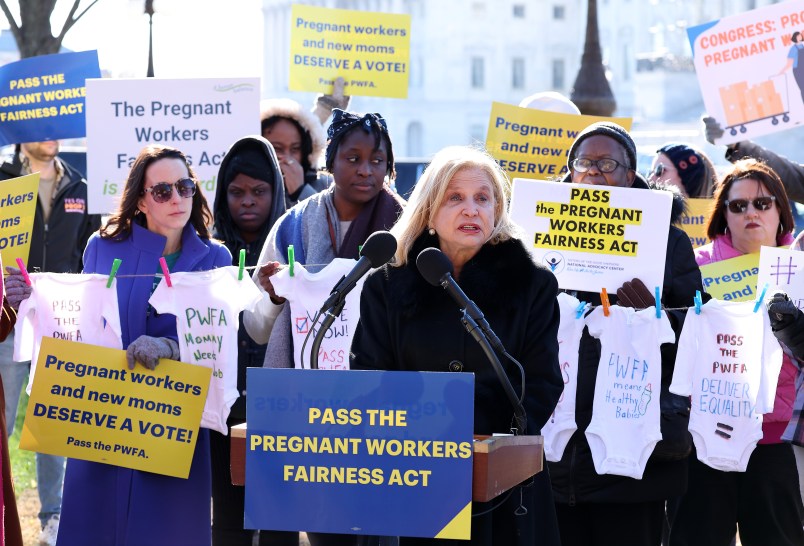This article is part of TPM Cafe, TPM’s home for opinion and news analysis.
The tune is getting frustratingly familiar — yet another hyper-extreme federal judge in Texas handed down a dangerous and dramatic decision restricting reproductive rights with national implications. Only this time, instead of putting limits on a safe and long-used medication or lifesaving emergency health care, the target is the Pregnant Workers Fairness Act (PWFA), a new bipartisan federal law that protects the health and safety of pregnant people in the workplace.
The PWFA went into effect in June of 2023 and now gives most employees the right to “reasonable accommodations” in relation to pregnancy, childbirth and related medical conditions. It generally requires employers to work with their employees to modify how they work, like allowing additional bathroom breaks or excusing them from certain duties. Previously, workers were only entitled to accommodations under federal law in connection with a pregnancy if they could satisfy the strict legal definition of a disability or could prove that comparable workers had been accommodated. The PWFA drew support from unusual allies like the U.S. Chamber of Commerce, along with advocates for women’s and workers’ rights. It passed both chambers of Congress with overwhelming bipartisan majorities.
But that bipartisan victory is now in jeopardy. At the time of the PWFA’s passage, House rules allowed the use of proxy votes in response to the COVID-19 pandemic — a flexibility widely used across the aisle. When congressional Republicans sued in 2020, claiming proxy voting violates the Constitution’s Quorum Clause, the D.C. Circuit barred the suit, citing the Speech and Debate Clause. Undeterred, Texas Attorney General Ken Paxton sued to block enforcement of the PWFA, again claiming the use of proxy voting violates the Quorum Clause when it means a House majority does not have to be physically present for the vote.
Last week, Judge James Wesley Hendrix — a Trump appointee serving the Northern District of Texas — concluded in Texas v. Garland that the PWFA’s passage via proxy votes was unconstitutional for that same reason. As a result, Judge Hendrix granted a permanent injunction blocking the federal government from enforcing the PWFA against the state of Texas. The injunction goes into effect next week and technically prevents enforcement only against the state of Texas — not against private sector Texas employers or any employers located elsewhere. The judge’s decision also purports not to bar individual workers from bringing PWFA claims. However, by prohibiting the federal government from accepting charges or issuing right-to-sue notices, the order prevents workers from completing a step that is legally required in order to bring such a claim in court. At minimum, despite its claims to the contrary, Judge Hendrix’s decision will create profound and potentially insurmountable barriers to Texas state employees’ ability to bring PWFA claims.
If and when the injunction goes into effect, it will have concrete harmful impacts on state employees in Texas, home to the third-largest state workforce in the country—harms that the court’s reasoning all but ignored. A key factor in the legal test for granting a permanent injunction is whether doing so will harm the public interest. While Judge Hendrix’s 120-page opinion mentions in passing that “the relevant public interest pertains to the PWFA’s application to employees of Texas,” he failed to devote any real analysis to the injunction’s actual impact on those employees. Instead, his decision generically and circularly asserts that any interest in an unconstitutional provision is inherently illegitimate. Thus, the needs of Texas employees are swept under the rug in favor of the state’s purported interest in treating its employees unfairly in ways that will particularly and profoundly harm women.
Beyond its formal impact, the decision creates a roadmap for future claims that the PWFA—and perhaps other legislation passed with proxy votes—is unconstitutional. This threatens an essential protection at a time when women and pregnant people are at ever increasing risk—with the courts leading the charge. And looking beyond the PWFA, this decision is only the most recent front of an escalating attack by a radical right wing judiciary that undermines our government’s ability to function and thwarts the will of the people. Without urgent action, these assaults on our democracy will only continue—and women will continue to pay the price.







They hate us. They really hate us. “We” being anyone who could ever get pregnant. The cruelty is the point.
But too many women don’t see this as affecting them. They control their own destiny with the vote, but they cannot see the forest for the trees.
Any woman voting Republican is voting to be a second-class citizen entirely at the mercy of some men (and women) who don’t care what happens to them, even when they’re pregnant.
It’s better answered not by just voting, but by running for the offices that affect women’s issues. And I don’t mean women like Cindy, who voted against IVF. I mean women who really understand all the related issues.
Although McCarthy v. Pelosi made it to SCOTUS, its constitutionality wasn’t addressed. It all fell under that infamous Speech and Debate Clause and “we make our own rukes.”
I think I am beginning to see a pattern.
You forgot the part about how if they are single moms, they should just pull themselves up by their bootstraps and not expect any help. Go to the churches, or something.